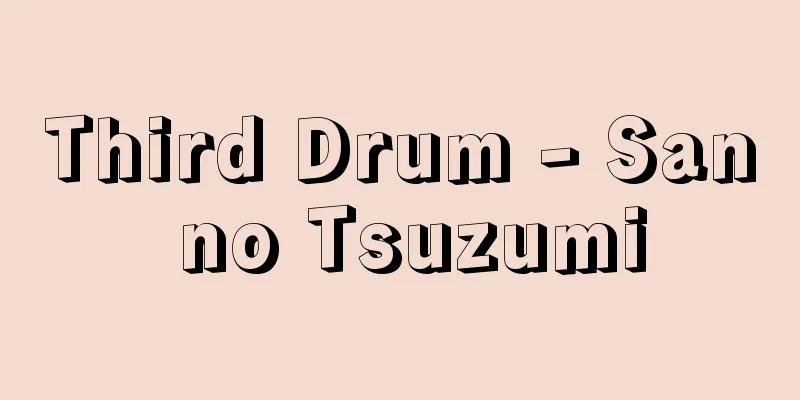Third Drum - San no Tsuzumi

|
A double-sided drum used in gagaku music. Also written as san-ko. The first drum (ikko), second drum (nikko), and third drum (sanko), which were introduced during the Nara period, are collectively called "kogaku drums," with san-no-ko being the largest of these and having been used in Uho-komagaku music since the end of the Heian period. It has an hourglass-shaped body that is 45 cm long and 19 cm in diameter, with skins about 42 cm in diameter stretched on both sides and tied with hemp strings called "shirabeo." When playing, it is placed directly on the floor, directly to the side, the strings are held in place with the left hand, and it is struck with a bachi (stick) in the right hand. In ensembles, like the kakko of Togaku, it plays the role of conductor, leading the overall tempo, but there are only two types of playing: a weak and short sound called "ten" and a strong and long sound called "teien," and there is no rapid succession of beats like in the kakko. The tone is also a little duller than that of the kakko. The three basic beats of Komagaku, Komayohyoshi, Agebyoshi, and Karabyoshi, are expressed by simple rhythmic patterns using these two types of percussion. [Yoko Hashimoto] Source: Shogakukan Encyclopedia Nipponica About Encyclopedia Nipponica Information | Legend |
|
雅楽に用いる両面太鼓。三鼓とも書く。奈良時代に伝わった壱鼓(いっこ)、二鼓(にこ)、三鼓(さんこ)を総じて「古楽鼓」というが、三ノ鼓はこのうち最大で、平安末期より右方高麗楽(うほうこまがく)に用いられている。長さ45センチメートル、口径19センチメートルほどの砂時計形の胴の両側に直径約42センチメートルの皮を張り、「調緒(しらべお)」と称する麻製の紐(ひも)で締める。演奏に際しては直接床の上に真横に置き、左手で調緒を握って固定し、右手の桴(ばち)で打つ。合奏では唐楽(とうがく)の鞨鼓(かっこ)と同じく、全体のテンポを主導する指揮の役割を果たすが、奏法は「テン」とよばれる弱く短めの音と「テーエン」とよばれる強く長めの音の2種類のみで、鞨鼓のような連打はない。音色も鞨鼓に比べるとややにぶめである。高麗楽の基本的な拍子である高麗四拍子(こまよひょうし)、揚拍子(あげびょうし)、唐拍子(からびょうし)の三つは、この2種の打音による単純なリズム型で表される。 [橋本曜子] 出典 小学館 日本大百科全書(ニッポニカ)日本大百科全書(ニッポニカ)について 情報 | 凡例 |
>>: Sanno Miraculous Tale - Sanno Miraculous Tale
Recommend
Mouse grass - Mouse grass
A perennial grass (illustration) commonly found in...
Plant height - Kusatake
The height of grass, especially the height of crop...
Magos
...For the first meaning, see the entry on magic,...
R & D - R&D
…Research and development is a collective term fo...
Negative element - Inseigenso (English spelling) negative element
This is the general term used for elements with a...
Petrus [of Alcantara] (English spelling)
1499‐1562 Spanish Franciscan and a leading figure ...
Trommsdorff, JB (English spelling) TrommsdorffJB
...Volume 1 covers general topics such as chemica...
Music Engineering - School
〘 noun 〙① A person whose occupation is playing mus...
Julio-Claudian dynasty - Julius-Claudian dynasty
The family name of the first 5 Roman emperors. The...
Topological group - Isougun (English spelling) topological group
To discuss transformation groups with continuity, ...
Golden Voice
Her real name was Rosine Bernard. She was known f...
Revolutionary Diplomacy
...When the attitude of spreading the gospel of A...
DaryaeLatafat (English spelling)
…The oldest collection of poems is Kulliyāt (1824...
Ktesias (English spelling)
A Greek historian around 400 BCE. He lived at the ...
Mánes, J.
… In the nationalism that followed after 1848, th...







![Mamurogawa [town] - Mamurogawa](/upload/images/67ccea39aafcf.webp)

